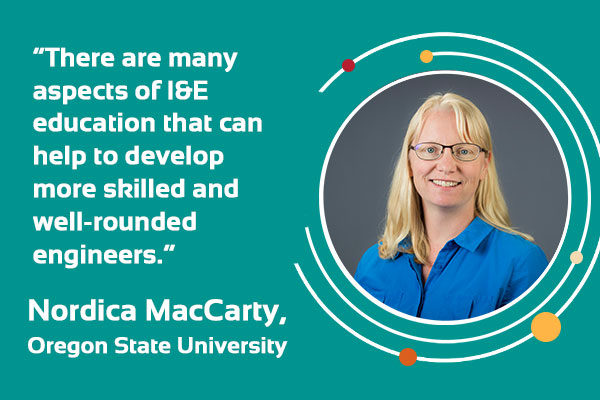
We continue our series highlighting educators within the VentureWell network who are doing good work—faculty members who are catalyzing change in higher education and inspiring students to impact the world through invention. This month’s faculty spotlight is Nordica MacCarty, Assistant Professor in the School of Mechanical, Industrial, and Manufacturing Engineering at Oregon State University. MacCarty engages with several VentureWell programs. She is a principal investigator for teams participating in the E-Team grant program and National Science Foundation (NSF) I-Corps program. She’s also a principal investigator for a Faculty Grant that supports the expansion of a multidisciplinary course within her department to become a hybrid course teaching social entrepreneurship and environmentally responsible design of household energy systems.
Why did you get interested in teaching entrepreneurship?
Several years ago, one of my students and I came up with an innovation that we thought could be very useful in the household energy sector. We were invited to participate in business accelerators and I-Corps, and were so fortunate to receive support from the VentureWell E-Team grant program. Through these experiences, I learned what valuable tools entrepreneurship could provide to students seeking to innovate for impact. This inspired me to do more with these great methods and resources, and to collaborate more with colleagues in business and social science.
What is your favorite thing about teaching?
I love to work closely with bright, passionate students who are inventing solutions to global challenges.
Where would you like to see the field of entrepreneurship in 5 years?
I’d like to see innovation and entrepreneurship (I&E) become more common in undergraduate engineering education. I was very entrepreneurial as a young person but was never offered the opportunity to learn about it as an engineering student. There are many aspects of I&E education that can help to develop more skilled and well-rounded engineers.
What are the challenges you’re tackling in your work today?
I am continuing to work on innovations that help meet basic needs and improve quality of life for low-resource populations. Typically this focuses on providing sustainable household energy sources and clean water in developing communities, but I am also interested in expanding to address domestic needs as well.
My lab is working on several projects to address these needs—from an energy efficient water purification system to a thermoelectric generator that produces electricity using waste heat from cooking.
What books on I&E have you been reading lately?
Solving Problems That Matter—And Getting Paid For It by Khanjan Mehta because he really illustrates how to help students and entrepreneurs identify their strengths and interests to find the best path to innovation. [Editor’s note: Read our Faculty Spotlight of Mehta here.]
What is your most useful classroom activity or assignment?
I’m using the systems mapping exercise that I learned about from Jeremy Faludi during the VentureWell faculty development workshop. It’s an excellent way to help students think about a problem more holistically.
Learn how a VentureWell faculty grant will enable student engineers at Oregon State University to develop a social entrepreneurial mindset while they’re working in the lab.